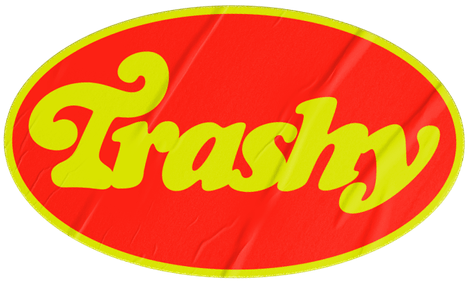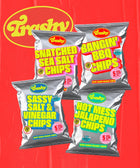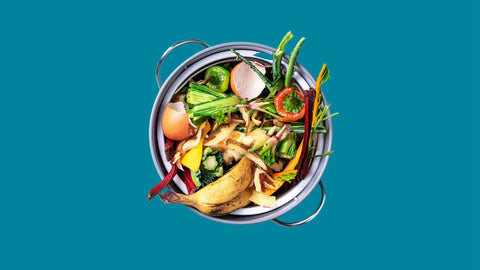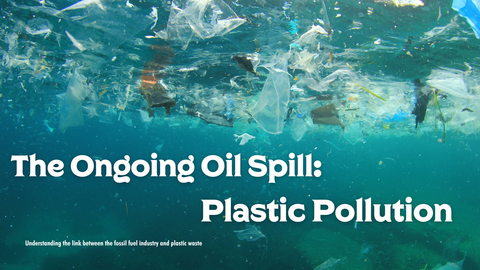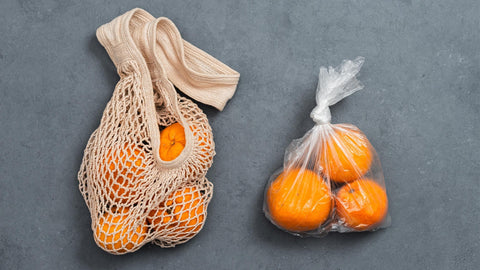
By Farah Stack
Whether it’s leftover juice pulp or plastic in the environment, we love picking up what’s been left behind to create a more sustainable future.
Pulp Pantry is proud to be a plastic neutral campaign. For every amount of plastic created, we help remove the equivalent amount of plastic waste from the environment. Since 2020, we have removed OVER 1 TON (!) of plastic through the Plastic Neutral Certification Program with the rePurpose coalition!
It’s great to see that we’re not the only brand out there doing our part to address the plastic problem through plastic neutrality. So, here are some of our favorite plastic neutral brands that you need to know and that we were lucky enough to do a Q&A with!

Sadrah Schadel, CO-Founder + Chief Creative Officer
Tell us about your brand:
No Evil Foods is the world’s 1st Certified Plastic Negative plant-based meat brand that creates killer plant-based meat from sustainable, non-GMO, and simple AF (animal free) ingredients. No Evil Foods believes that you don’t need to wreck the planet to eat and you shouldn’t have to compromise taste for health! Our products can be found nationwide at retailers like Whole Foods, Sprouts, Wegmans, and Walmart.
I started my company because I wanted to create a positive impact through our products and enable people to live healthier, more sustainable lives. And we are doing that – we are saving animals by creating a comparable meat experience, we are improving the health of our consumers by creating products that are less processed and more nutrient dense than the alternatives and we are improving access to those products. But as our company grew and with each unit we sold, I couldn’t shake the fact that we were also contributing to a major problem, we made the decision to take responsibility for our plastic waste by becoming the world’s first plastic negative plant-based meat brand, removing and recovering 200% of the plastic created through our packaging.
Why does Plastic Neutral matter to No Evil Foods?
Our mission statement includes the health of the planet as well as the health of people. But when we think about the health of people–we not only consider that from an ingredient standpoint, by creating products that are nutrient-dense, minimally processed, and contribute to lower risks of health-related illnesses like heart disease and diabetes– we're also thinking about health in terms of who has access to healthy food and who doesn't. Our food choices impact communities around the globe!
Providing an alternative to animal meat that’s comparable in price & quality supports our broader vision to create healthy communities and reduce emissions. By making products that encourage consumers to reduce their consumption of animal-based meat, we are already playing a role in reducing global greenhouse gas emissions, land & water use/pollution, decreasing the number of forests cleared to grow crops to feed to farmed animals, and more. But as we work to solve one problem, I don’t want us to lose sight of how we’re contributing to another, and plastic waste is a big one.

How does Plastic Neutral fit into your brand’s sustainability strategy?
Beyond its impacts to animals and waterways, there’s a real human cost to our dependency on plastic. The U.S. continues to ship its plastic waste across the world, largely to the poorest countries with insufficient waste management systems, forcing workers into low-paying jobs and perpetuating a cycle of poverty.
As a brand with sustainability built into its core, we need to recognize the unintended consequences of our reliance on single-use plastic. We can no longer ignore it or its impact on people, planet, and animals. We need to move beyond merely creating plant-based products to creating a truly sustainable food system.

Zoë Geller, Co-Founder
Tell us about your brand:
Fire Ox's mission is to make delicious, vegetable-based foods accessible to all. In 2018, Jason Yang and Zoë Geller teamed up to found Fire Ox over a shared vision: to make food that is better for people and the planet by helping people eat more vegetables. They saw an opportunity to make delicious and satisfying vegetable dishes inspired by cuisines from around the world that they loved. To that end, they make a line of tasty frozen veggie bowls like their Braised Ethiopian Greens and Provencal Ratatouille. All their meals are vegan, gluten-free, and made with no artificial ingredients.

Why does Plastic Neutral Matter to Fire Ox?
We believe that Earth is our home and, as a business (an albeit very small one), we have a responsibility to do everything we can to take care of it. In fact, we exist to create food that improves human health and protects our planet, instead of destroying it.
To us, part of that is choosing packaging that does no harm to our planet. Due to the nature of our products, it is nearly impossible to choose packaging that creates zero waste. That’s why we are so excited to work with rePurpose Global to reduce our product’s footprint by offsetting our plastic waste. In order to mitigate the environmental impact of our packaging even further, we have chosen to use FSC certified paper packaging that is 100% curbside recyclable with other paper goods.
How does Plastic Neutral fit into your brand’s sustainability strategy?
The sustainability of our packaging is just one part of our brand’s larger sustainability strategy. At Fire Ox, we think about our big-picture strategy as first understanding and evaluating the environmental impact of our company and our products, and then figuring out which levers we can realistically pull to offset those impacts.
Since most of our environmental footprint that we can control is concentrated in the product realm, we have focused on evaluating our packaging, ingredients, and shipping materials in order to reduce our impact as much as possible. And that’s part of the reason why becoming plastic-neutral certified was such a big win for us. We didn’t want to use non-recyclable plastic to package our meals that would go straight to the landfill, but we didn’t have a choice since there were currently no other options. So working with rePurpose Global is enabling us to offset our plastic waste and take one big step towards meeting our zero-waste packaging goal.
How we source our ingredients is another way we think about how to reduce our environmental impact. We intentionally use 100% plant-based ingredients and do our best to source locally-grown vegetables in order to reduce the carbon and water footprint of each of our meals.
We do all these things not just because it matters to us and it’s the right thing to do, but also because we want to be leaders that catalyze and inspire environmental stewardship among our consumers. Businesses need to take the lead now more than ever on educating consumers on what matters, why it matters, and what they can do to make a change with us.

Emily Griffith, Founder & CEO
Tell us about your brand:
Lil Bucks makes crunchy snack clusters and super-seed toppings from sprouted buckwheat seeds that are sustainably grown in the USA. We got the idea for it after seeing sprouted buckwheat's widespread popularity while living in Australia, and after learning about the human health and soil health benefits we had to spread the buckwheat love in the USA!
Why does Plastic Neutral Matter to Love Lil Bucks?
We have been on a long journey to find the most sustainable packaging for our snacks and granolas. We've tried compostable and recyclable but they didn't protect the food enough and it ultimately would lead to more food being wasted, so while we wait for the technology on more sustainable food pouches to catch up, we're doing plastic neutral to at least cancel out the plastic we have to use and empower another community making huge strides in recycling.
How does Plastic Neutral Fit into your brand’s sustainability strategy?
Plastic neutral isn't the end of the sustainable road for us, but it is a step in the right direction on a journey to more sustainable packaging. We want our business to be as sustainable as possible from end to end, so everything from where we produce to our packing materials to our ingredient sourcing to, of course, our packaging, we want to do our best. When a solution can't be perfectly sustainable, we find the best possible case or see how our business can make up for it, like becoming plastic neutral certified for example. Our biggest impact comes from sourcing from an American regenerative organic certified buckwheat farm. We have an exclusive partnership with them and plan to source as much buckwheat as they want to grow as a cover crop on their farm, and then we'll start buying from another regenerative farm. Regenerative organic products are more expensive but we believe the commitment to these types of farming practices is integral for the future of food and the health of our planet.

Kaitlin Mogentale, Founder & CEO
Tell us About Your Brand
Pulp Pantry is building the next generation of CPG, made better for people and the planet. A leading brand in the upcycled food movement, Pulp Pantry turns overlooked resources including odds, ends and stems of farm-fresh produce into wholesome everyday snacks. We’ve created a line of veggie chips reinvented, made from upcycled ingredients (the pulp from organic cold-pressed juice!) providing nearly a full day’s serving of fiber in each bag.
Why does Plastic Neutral Matter to Pulp Pantry?
Our packaging helps us tell our story and communicate our values as a brand, but we wanted it to also speak truth to the legacy we seek to leave behind - leaving the Earth better than we found it. Plastic Neutral Certification is one step in a long-term commitment to give our product’s end of lifecycle the attention (and intention) it deserves.
Today, we produce nearly 15 million tons each year. Yet in the US, only 9 percent of our plastic trash is recycled. Globally, it's estimated that 8 million tonnes of plastic enter our waterways each year.
We've worked hard to find compostable solutions that might work for us, and we continue to do so. Truth is, the industry is just beginning and options that are reasonably economical, truly biodegradable, and that protect product integrity are difficult to come by. But that was no excuse for complacency. We couldn't sleep at night knowing that our packaging might be just another statistic of ocean-bound plastic polluting our precious waterways.
Through our partnership with rePurpose Global, we’re able to empower waste workers at our partner plant CarPe, in India, to fight plastic pollution in the community, while supporting ethical wages. The problem of solid waste management has been largely ignored in rural India, creating a crisis of waste dumping and environmental degradation due to lack of infrastructure, capacity-building, and awareness.
How does Plastic Neutral Fit into your brand’s sustainability strategy?
Pulp Pantry is on a mission to create a scalable, circular model for consumer packaged foods. In order to tackle global issues like food waste and climate change, Pulp Pantry strives for circularity in every aspect of business, from sourcing to packaging.
We believe in maximizing resources for the health of people and the planet. Achieving Plastic Neutral Certification through rePurpose Global is one small step in a continued commitment to improve upon the environmental impact of Pulp Pantry's business.
In order to tackle global issues like climate change and pollution, we strive for circularity in every aspect of their business, from sourcing to packaging. We believe in maximizing resources for the health of people and the planet. Achieving Plastic Neutral Certification through rePurpose Global is one small step to improve upon the environmental impact of our business.
